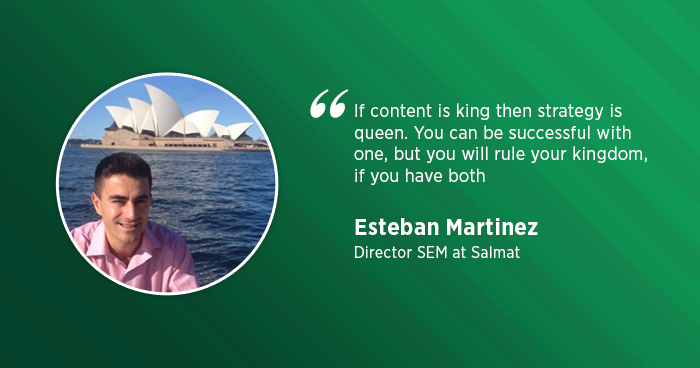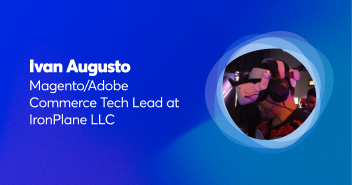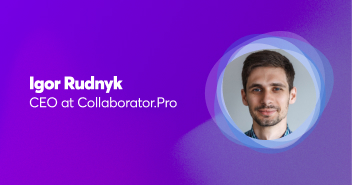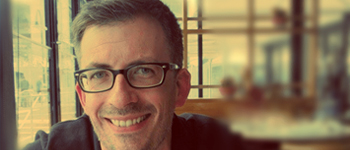
Esteban Martinez has always loved maths and this love affair with calculations led him to be a SEM expert and online marketing specialist. Esteban gained first-hand experience of using Google AdWords while working for the UK’s leading travel agency First Choice. With an experience spanning 15 years, Esteban is now the Director SEM of Salmat, an Australian agency.
In his interview with Cloudways, Esteban shares his journey from the start and offers some valuable tips on improving a brand’s online presence. We asked him about the difference of experience between freelancing and a full time job. He also discussed the future of PPC marketing and how he sees the Australian online advertising industry.
To know more insights, let’s dive deep into the interview and make you aware of some expert advice by Esteban Martinez.
Hello Esteban, thanks for sharing some of your valuable time with us!
Q) To start off, tell us a bit about your early days as an online marketer and how your journey started? Who (or what) motivated you to take on this career?
I have always enjoyed working with numbers and Maths was my favourite subject. Starting in 2002, Google had just overtaken Yahoo as the leading search engine, so there was a lot of attraction to online marketing.
At the time I was working for one of the UK’s leading travel companies First Choice, where I developed my experience in advertising on Google AdWords.
I enjoy problem solving through numbers, and this interest grew through PPC marketing.
Q) Growing a business with PPC marketing is an art and growth hacking is on fire these days. What tips would you like to give for businesses to build up their brand’s online presence?
To be successful in digital marketing you need to know your target audience and be able to analysis data.
Take baby steps at the beginning. Start with a small budget and build PPC campaigns closely around the core search terms associated with your business.
Q) Esteban, you previously worked as a freelancer and now you have a permanent job and a typical office routine. What differences did you find in both of the styles of working and which style did you enjoy more and why?
Freelancing is great, as you get to work with business owners and key stakeholders to get the best results fast. Although, you tend to work on your own and projects tend to have a short life span.
Agency life is also great, as you get to work across multiple accounts in different industries at the same time, so you’re exposed to different results all the time. What might work for one client, might have a completely different outcome for another.
I prefer agency side more, as you become part of a bigger team with great tools and clients. This can allow for a faster learning’s and experience.
Q) Could you tell us a bit about your hands on experience with AdWords and Bing? Which platform would you rate as a better option for marketers and why?
This is a tough question as it depends on your objectives and budget.
Bing has less competition, meaning it has lower Cost Per Clicks and Cost Per Sales, making it highly profitable. On the flip side, it has a smaller user base.
Bing recently announced it had grown its UK market share to over 25%. In the US, their stake is 33% and Australia has grown substantially to over 12% market share in the last three years.
Google, on the other hand has a huge global audience, making it easier to pinpoint your customers at scale. The main downside it the increasing number of companies who are advertising on the platform, which increases the Cost Per Clicks and Cost Per Sales respectively.
Q) Given that most startups have a severe resource constraint, what tips would you give our budding entrepreneurs for online marketing on a budget? Do you think PPC campaigns are a good option for such startups?
Growing a startup business can be very challenging. One of the biggest hurdles I’ve seen for startups through to established businesses is how to market your business successfully.
You can have the best company, team, product and offer, but if no one knows about it, then this will impact performance.
Businesses of all ages and sizes need to know exactly who their core target audience is before turning to PPC. Once they know the size of their audience, I recommend starting with a small budget to get data, learn what is working and monitor performance. Then revised your campaigns and slowly increase your budget only when you see a positive return.
Q) Every career promises highs and lows. Tell us about some of the main obstacles and challenges you faced while learning and undertaking PPC marketing?
When I was growing my company back in the UK, we struggled with recruitment. A company is only as good as its staff and finding the best people isn’t as important as finding the right people. Staff can affect so many elements in a company’s success.
We found great success in apprenticeships, where we were able to train and develop our staff so that they soon became experts in building, optimising and growing our PPC clients.
This also improved client and staff retention, which in turn helped our company to grow.
Q) Australian ecommerce industry is on the boom and is raking in millions. In your opinion, how feasible is PPC marketing is for ecommerce and what is your take on PPC strategies for ecommerce?
PPC campaigns can be a real accelerator for ecommerce businesses in Australia and across the globe. I tend to look at the 4 core metrics:
- Online conversion rate
- Average sale value
- Cost Per Sale
- Monthly visitors
This information provides the foundation from where we can start and grow our PPC campaigns.
For example, if an ecommerce client has a 2% conversion rate with an average order value of $200, then we can calculate that to generate $1,000 in sales we need 5 sales.
From here we can then go further and say we need 250 visitors.
This can allow for many ecommerce businesses to generate and increase online sales.
Q) How do you see the Australian online marketing industry as it currently stands? According to your vast experience, what do people prefer in Australia: Organic or paid advertising? Moreover, in your opinion, what is the best practice of online marketing to capture a sizeable chunk of the local market?
Australia is behind the UK in terms of online marketing, this is partly due internet speeds, which limit people from searching and buying online. The Australian government has invested to rollout the National Broadband Network (NBN) by 2020.
The vast size of the country makes delivery of product slow, expensive and unpractical. People wouldn’t order a low value item such as a toaster from Perth to get it delivered to Sydney, whereas in the UK you could order a kettle from Scotland and it would be delivered in Cornwall next day.
In term of organic and paid media, Google Ads have evolved a lot from 2002 when they overtook Yahoo to become the leading search engine. It is becoming harder for the general public to identify what is a paid ad and what isn’t.
Google Ads dominate the first page on mobile devices, which makes it even more important to have the best possible ad appear to reflect your business and target customers.
Q) “Content is king”, this statement was made by Bill Gates decades back. Being an online marketer, do you still agree with this notion? How important of a role do you think keywords and their placement plays in the marketing realm?
If content is king then strategy is queen. You can be successful with one, but you will rule your kingdom, if you have both.
I recently heard a great marketing quote from Jeff Allen, president of Hanapin Marketing “Search is about harvesting demand, not generating it. Put yourself in the position to harvest as much of that demand as you can.”
In order to do this successfully, we need to look at more than just keywords and content, we need to look at consumer demand.
Analysing data can put us in the best position to identify and market consumer demand. Put another way, if you have amazing content, but it doesn’t help with what customers are looking for, then is content really king?
Q) PPC, SEO and Social media marketing are undoubtedly the top marketing channels when it comes to driving leads and conversion rates. What marketing tools you prefer to use?
A lot is the short answer:
- SEMrush
- Moz
- Hitwise
- Ahrefs
- Followerwonk
- Klout
- BuzzSumo
- Buffer
- Wayback Machine
- Supermetrics – My favourite as it uses API feeds from all data sources
- Screaming Frog
- BuzzStream
- Keyword Tool
- Google AdWords
- Google Analytics
- Bing Ads
Q) Everyone needs some time off to enjoy personal endeavours. Tell us about some of the exciting activities you undertake in your leisure life.
I enjoying cooking on the barbeque; nothing beats food, friends and a cold beer. Living in Sydney, I like to keep active running and cycling, although I haven’t got into surfing yet.
Q) Nothing is better than having friends in the same profession. Tell us about your close friends from the online marketing industry?
My friend Pin from Zone 1 Creative in the UK is amazing, we still keep in touch and talk about marketing, website development and everything digital. He created my old company’s website Active Pay Per Click, which I’m still proud of.
Dan Siepen is another great guy in Melbourne who is the organizer of Growth Hackers Sydney. He’s an incredible developer and entrepreneur who hosts Australia largest marketing networks across Australia.
I was privileged to talk at Growth Hackers Sydney in July on PPC and how to turn $1 into $4.
Q) When we talk about socializing, it’s all about networking these days. Do you attend conferences frequently? Which conference has been the most captivating for you so far?
I’ve been in Sydney for a year now and when I first arrived I would go to as many networking events as possible.
My favourite ones are Growth Hackers Sydney, Online Marketing Sydney and Big Digital Adelaide.
The next one I’m looking forward to is Startcon in December with top speakers such as Dennis Yu (Facebook marketing legend), Sarah Bird CEO at Moz and Yara Paoli from Skyscanner.
Q) Who doesn’t want to see the work desk of an expert? Would you post a picture of your work space?

Q) Young individuals who are about to enter the online marketing domain are always eager to get some valuable advice from experienced professionals. As an influencer, what advice would you give your newbie fans?
Set goals, learn from mistakes and work hard. I’ve been in online marketing since 2002 and I’m still learning new things. There are no experts only more experience.
I’m a keen fan of helping others and can be contacted on Twitter.
Umair Qureshi
Umair Qureshi works as Assistant Digital Marketing Manager for Cloudways- A Managed Cloud Hosting Platform. He loves combining creativity with skills and marketing with technology.


